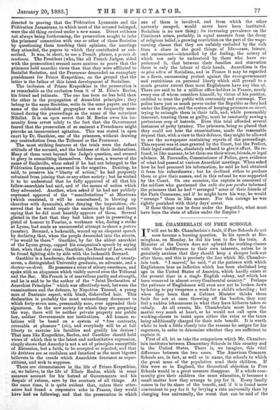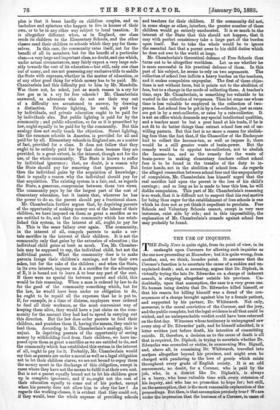MR. aHAMBFIRT. AIN ON FREE SCHOOLS.
IT will not be Mr. Chamberlain's fault, if Free Schools do not soon become a burning question. In his speech at Bir- mingham, on Monday, he did his best to fire the train. A Minister of the Crown does not upbraid the working-classes. with their indifference to their own interests, unless he is genuinely anxious that they should keep a sharper look-out after them, and this is precisely the line which Mr. Chamber- lain took. " I marvel," he said, " at the patience with which Englishmen bear an infliction which has been abolished long ago in the United States of America, which hardly exists at the present time in a single English -colony, and which has been removed in almost every Continental country." Perhaps the patience of Englishmen will even now not be broken down by having to pay twopence a week for a child's schooling ; but when they learn that a Cabinet Minister thinks them. fools for not at once throwing off the burden, they may feel a sudden irksomeness in what they have hitherto taken so calmly. At all events, Mr. Chamberlain must have the matter very much at heart, or he would not call upon the working-classes to insist upon either the rates or the taxes being additionally charged for their sole benefit. It is worth while to look a little closely into the reasons he assigns for his eagerness, in order to determine whether they are sufficient to explain it.
First of all, let us take the comparison which Mr. Chamber- lain institutes between Elementary Schools in this country and in the United States. There is, we imagine, this vital difference between the two cases. The American Common Schools are, in fact, as well as in name, the schools to which the great mass of the population send their children. If this were so in England, the theoretical objection to Free Schools would in a great measure disappear. If a whole com- munity give their children the same education, it becomes a small matter how they arrange to pay for it. Every family comes in for its share of the benefit, and if it is found more convenient to pay for it by levying a rate universally than by charging fees universally, the worst that can be said of the plan is that it bears hardly on childless couples, and on bachelors and spinsters who happen to live in houses of their own, or to be in any other way subject to local taxation. It is altogether different when, as in England, one class sends its children to the Elementary Schools, and the other classes send their children to schools which they pay for them- selves. In this case, the community rates itself, not for the benefit of all its members, but for the benefit of a particular class—a very large and important class, no doubt, and one which, under actual circumstances, may fairly expect a very large sub- sidy towards the cost of its education—but still, only one class out of many, and one not possessing any exclusive title to saddle the State with expenses, whether in the matter of education, or of any other good thing for which money has to be paid. Mr. 'Chamberlain had this difficulty put to him by Mr. Mundella. Was there not, he asked, just as much reason in a cry for free gas as in a cry for free schools ? Mr. Chamberlain answered, as advocates who do not see their way out of a difficulty are accustomed to answer, by drawing a distinction. Private lighting, he said, is paid for by individuals, and private education ought to be paid for by individuals also. But public lighting is paid for by the community ; and public education, so far as it is prescribed by law, ought equally to be paid for by the community. But this analogy does not really touch the objection. Street lighting, like the common schools in America, is provided for all and paid for by all. Elementary schools in England are, as a matter of fact, provided for a class. It does not follow that they ought to be entirely paid for by that class, because they are provided, to a great extent, in the interest, though not for the use, of the whole community. The State is known to suffer by individual ignorance ; that, no doubt, is a reason why the State should pay for removing that ignorance. But then the individual gains by the acquisition of knowledge ; that is equally a reason why the individual should pay for that acquisition. The existing system is a fair, and, as regards the State, a generous, compromise between these two views. The community pays by far the largest part of the cost of elementary education, but it insists that, wherever he has the power to do so, the parent should pay a fractional share.
Mr. Chamberlain further argues that, by depriving parents of the opportunity of making money out of the labour of their children, we have imposed on them as great a sacrifice as we are entitled to do, and that the community which has estab- lished this system, in the interest of all, ought .to pay for it. This is the same fallacy over again. The community, in the interest of all, compels parents to make a cer- tain sacrifice in the interest of their children. It is not the community only that gains by the extension of education ; the individual child gains at least as much. Yes, Mr. Chamber- lain may be supposed to say, the individual child, but not the individual parent. What the community does is to make parents forego their children's earnings, not for their own sakes, but for the sake of the children ; and when the State, in its own interest, imposes on A a sacrifice for the advantage of B, it is bound not to leave A to bear any part of the cost. If there were no special tie between parent and child, this would be fair reasoning. When a man is ordered by law to do for the good of the community something which, but for the law, he would have been under no obligation to do, he. ought to be repaid all the expenses that he is put to. If, for example, in a time of distress, employers were ordered to feed all their workmen, as the most convenient way of keeping them alive, they would have a just claim on the com- munity for the amount they had had to spend in carrying out this direction. But the law does order parents to feed their children, and punishes them if, having the means, they omit to feed them. According to Mr. Chamberlain's analogy, this is unjust. In depriving parents of the opportunity of saving money by withholding food from their children, we have im- posed upon them as great a sacrifice as we are entitled to do, and the community which has established this system in the interest of all, ought to pay for it. Probably, Mr. Chamberlain would Bay that as parents are under a moral as well as a legal obligation not to let their children starve, we are not bound to repay them the money spent in the discharge of this obligation, except in cases where they have not the means to fulfil it at their own cost. But is not a parent equally bound not to let his children grow i up in complete ignorance, and if so, ought not the cost of their education equally to come out of his pocket, except when his poverty does not allow him to obey the law ? As regards the working-classes, it is evident that they could not, if they would, bear the whole expense of providing schools and teachers for their children. If the community did not, in some shape or other, interfere, the greater number of these children would go entirely uneducated. It is so much to the interest of the State that this should not happen, that it may with perfect consistency take a large part of the burden upon itself. But to take the whole would be to ignore the essential fact that a parent owes to his child duties which he does not owe to the world at large.
Mr. Chamberlain's theoretical defence of- Free Schools thus turns out to be altogether worthless. Let us see whether he is more successful in his practical defence of them. In this part of his subject, he seems to rely on two arguments. The collection of school fees inflicts a heavy burden on the teachers, and it makes compulsion unpopular. The first of these objec- tions is not without force, but it points not to the abolition of fees, but to a change in the mode of collecting them. A teacher's time, says Mr. Chamberlain, is something too valuable to be. wasted in the collection of twopences. Then let some one whose time is less valuable be employed in the collection of two- pences. Let school fees be got in by a fee-collector, just as rents are got in by a rent-collector, or rates by a rate-collector. It is not an office which demands any special intellectual qualities, and a teacher must be but a poor hand at his trade, if he is not fit to do better things than extract school fees out of un- willing parents. But this fact is no more a reason for abolish- ing fees than the fact that, if the Chancellor of the Exchequer had to collect the Income-tax, as well as impose it, there would be a still greater waste of brain-power. But the remedy would be to appoint tax-collectors, not to abolish the Income-tax, and so the remedy for the waste of brain-power in making elementary teachers collect school fees is to be found in the transfer of the duty to in- ferior hands, not in the abolition of school fees. As regards the alleged connection between school fees and the unpopularity of compulsion, Mr. Chamberlain has himself urged that the real sacrifice laid upon the parent is the loss of his child's earnings ; and so long as he is made to bear this loss, he will dislike compulsion. This part of Mr. Chamberlain's reasoning is so weak, that it is difficult not to suspect that his real motive for being thus eager for the establishment of free schools is one which he does not as yet think it expedient to proclaim. Free Schools and Voluntary Schools cannot, except in very rare instances, exist side by side ; and in this impossibility, the explanation of Mr. Chamberlain's crusade against school fees may probably be found.



































 Previous page
Previous page